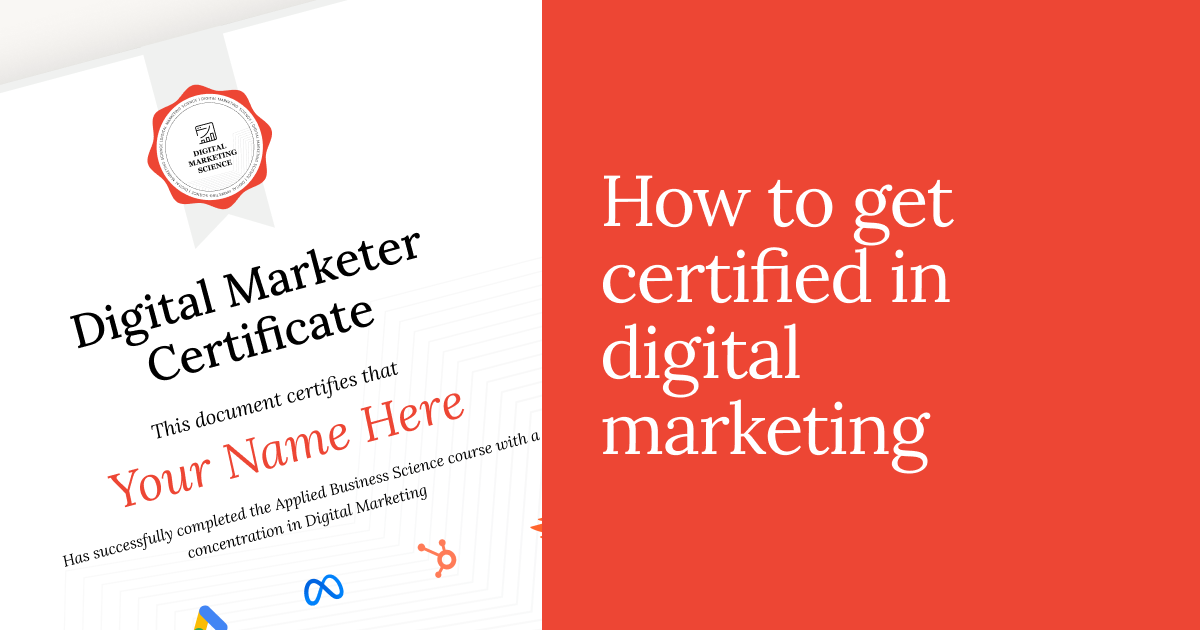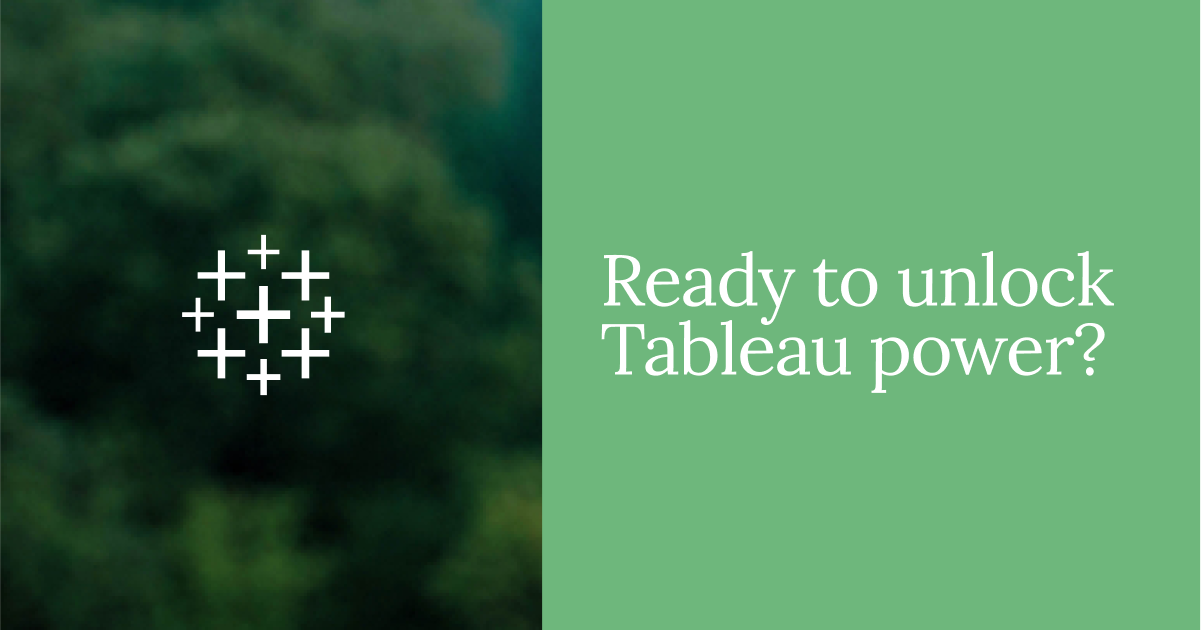
Earning a professional certificate in any industry can showcase your abilities and help you get seen by employers. Digital marketing is no different.
If you’re just starting to research the digital marketing certifications available, you may be wondering where you should begin. Below, we’ll break down some of the top certifications for digital marketers at all stages of their career—and we’ll tell you what you need to do to earn them yourself.
What is a digital marketing certification?
A digital marketing certification signifies mastery of a particular skill set or knowledge base. It communicates that you have a strong grasp on digital marketing foundations, which means employers can spend less time training you and more time enjoying the outcomes of your efforts.
Emerging skills in digital marketing
As the industry evolves, digital marketers need to stay on top of new technologies and tools. Digital marketing professionals must now include advanced skills like data analysis, marketing automation, and leveraging artificial intelligence (AI) to optimize campaigns and enhance customer experiences. Certifications like those offered by Google, HubSpot, and Ziplines focus on these emerging skills, ensuring you’re equipped to handle the latest trends and tools in digital marketing.
Benefits of a digital marketing certification
According to Salesforce’s 2024 State of the Connected AI Customer report, 73% of customers feel that companies treat them as unique individuals, a significant increase from 39% in 2023. This shift underscores the growing importance of personalized marketing strategies.
To meet these heightened expectations, businesses need digital marketing experts who understand how to implement a digital marketing strategy and enhance business outcomes. Earning a digital marketing certification can instantly communicate qualifications, including:
- Credibility and formal training: Demonstrates a commitment to professional development and industry standards.
- A comprehensive understanding of digital marketing techniques: Equips you with the knowledge to design and execute effective campaigns.
- A strong grasp on industry trends: Keeps you informed about the latest developments, such as the integration of AI tools like generative AI and AI agents in marketing strategies.
- Commitment to continued education: Shows a dedication to staying current in a rapidly evolving field.
Becoming a certified digital marketing professional can help you showcase your digital marketing expertise and increase your chances of getting hired, especially as businesses seek individuals who can deliver personalized and innovative marketing solutions.
Digital marketing certifications overview
Curious about the digital marketing certifications available? Here’s a breakdown of some of the more popular options:
- Google Analytics: This certification demonstrates your ability to parse through data, identify trends, and present your findings in a clear manner. It is a great option for digital marketers who want to leverage the power of data but don’t have any experience with analytics.
- Google Ads Search: This certification demonstrates your proficiency in creating and managing Google Ads on the search platform. If you plan to pursue roles that engage in online advertising, this credential can give you the strategic edge you need.
- HubSpot Email Marketing: This certification demonstrates your skills in developing targeted email campaigns that generate results—and revenue. Anyone involved in email marketing can benefit from earning this globally recognized credential.
- Microsoft Advertising: This certification demonstrates your understanding of the search advertising ecosystem, including solutions and best practices. It can make you more marketable to more businesses, as it opens you up to opportunities with companies that use Microsoft to manage their ads.
- Hootsuite Social Media Marketing: This certification demonstrates your knowledge across the Hootsuite environment, from profile optimization to audience building and more. If your marketing career path includes social media tasks, this is a great certification to have under your belt.
Become certified in digital marketing in six steps
Once you’ve determined that you want to pursue a digital marketing certificate, take time to assess your goals and determine the certification that will help you reach them. Below, we’ve outlined six steps to earning your chosen certification through a digital marketing course.
Step 1: Research and self-assessment
Whether you’re new to digital marketing or have some industry experience, it’s good to have a view of the full landscape and your current skill level before choosing a specialization. With the rise of AI tools and automation across various marketing channels, the landscape is rapidly evolving. Ask yourself the following questions:
What kinds of marketing activities do I enjoy?
- Consider how AI tools can enhance your digital marketing efforts. Are you interested in AI-powered content creation using platforms like ChatGPT or Jasper AI? Or perhaps you’re excited by AI-driven analytics that help optimize marketing strategies in real-time, such as tools offered by Google Analytics 4 or HubSpot?
- Do you find data analysis and campaign automation compelling? If so, certifications focusing on analytics platforms like Google Analytics or Microsoft Advertising with a focus on automation could be ideal.
- Do you want to master SEO and content creation? AI tools such as Surfer SEO and Clearscope can help streamline content optimization, making it an exciting area to explore in-depth.
What are my career goals in digital marketing?
As the digital marketing space grows, you may choose to specialize in a niche area such as paid media, AI in marketing, or SEO. Consider roles like AI marketing strategist, data-driven content manager, or social media manager focusing on automation and AI tools.
If you’re just starting, consider broad certifications like Google’s Digital Garage or HubSpot Inbound Marketing, which cover a wide array of digital marketing skills.
For those with experience, specialization in programmatic advertising, data science for marketing, or AI-powered customer engagement can significantly advance your career.
What skills do I need to build in order to reach my goals?
- Emerging technologies: Identify skills related to emerging technologies like AI, voice search optimization, chatbots, and machine learning for marketing. Tools like ChatGPT for content generation or AI-driven email marketing platforms like Mailchimp are becoming industry standards.
- Automation: Learn about marketing automation platforms such as HubSpot or Marketo, which incorporate AI to personalize marketing campaigns.
- Cross-channel campaign management: AI-powered tools like Hootsuite Insights or Sprout Social can help you manage multichannel campaigns more effectively. If you want to focus on these skills, consider certifications in social media management or multichannel marketing.
Step 2: Select a certification program
At this point, you should have a clear idea of the skills you want to learn and a list of potential digital marketing courses and certification programs.
Remember: Not all certification programs are created equal. As you explore the various offerings, consider factors such as the program’s reputation and accreditation, curriculum and course content, instructor quality, networking opportunities, and industry recognition. Assess each option based on your own criteria.
Here’s how Ziplines’ Digital Marketing Certificate Course stacks up:
Program reputation and accreditation
All certifications are affiliated with recognized organizations including Google and Hubspot
Curriculum and course content
Curriculum covers in-demand skills as dictated by industry expert curriculum advisors
Instructor quality
All sessions are led by digital marketing professionals who offer mentorship support
Networking opportunities
Professional services prepare learners with access to a career hub and group workshops
Industry recognition
Ziplines' instruction aligns with industry-recognized certification milestones
Hands-on learning
Students complete a variety of project-based activities that correspond with their chosen certification
Program cost and duration are other important elements that may impact your final decision. Reach out to the programs you’re interested in to learn about scholarship options, payment plans, and course timelines.
Step 3: Enroll in your chosen course
This is one of the most exciting steps on your journey to becoming digital marketing certified. You’ve set your sights on your next career step, determined your skill gaps, identified a certification, and chosen a program to help you get there.
Enrollment will look different for every certificate program, but a general process might look like the following:
- Submit your information to access course materials
- Speak to an admissions advisor to answer any questions you may have
- Review full course details and make a final decision
- Register for the course
- Pay tuition and associated fees
- Access learning materials
- Start learning
Some programs may require applicants to undergo an interview or assessment to ensure that they are a good fit. Many of those programs offer pre-course work that can help you get up to speed on digital marketing foundations before classes officially start.
Step 4: Begin the course
Your overall learning experience will vary by the program and institution you choose. If you’re curious about what you can expect, here’s an overview of the topics covered in the Ziplines Digital Marketing Certificate Course:
- Search engine optimization (SEO)
- Email marketing
- Personas and digital marketing strategy
- Marketing automation with HubSpot
- Paid search, paid social, and multichannel campaigns
- Marketing analytics
- Content marketing
- AI for digital marketing
Ziplines classes meet during weekly live online sessions taught by industry experts and led by mentors with subject matter expertise. By the end of the course, learners should be able to develop comprehensive marketing plans to solve business challenges. They demonstrate their expertise in a “Playbook assignment” at the end of each module, shared with industry experts and peers.
Tips for effective learning
No matter the format of your digital marketing certificate program, your success will depend on your preparation and ability to overcome the inevitable challenges that come with learning a new skill. During your program, make sure to:
- Create a study schedule and stick to it. Getting into a routine is essential to prevent mental fatigue and ensure consistent progress. In today’s fast-paced digital landscape, consider integrating micro-learning sessions, focusing on one concept at a time, to enhance retention and avoid burnout. Use productivity tools like Trello, Notion, or Google Calendar to organize your schedule and set reminders for study sessions, assignments, and exams.
- Stay organized and keep track of assignments, exams, and important dates. Digital marketing courses often involve learning a variety of tools (like Google Analytics, HubSpot, or AI-driven platforms), so keeping track of your coursework, certifications, and tool-specific assignments is essential. Consider using an online dashboard to manage your progress and deadlines for multiple tools and platforms. Stay updated with evolving tools and new marketing trends by following industry blogs like Moz, HubSpot, or Search Engine Journal.
- Review and reflect on your work, especially areas that need improvement. With the integration of AI tools in marketing, review your work critically to understand how AI could streamline your processes. For example, can AI help optimize your SEO work, automate email campaigns, or analyze data more effectively? Reflecting on how AI could enhance your strategy will help you stay on top of the latest digital marketing practices. Regularly assess your progress through real-world applications, like running campaigns or using marketing analytics platforms, to see how well you can apply your learning to practical scenarios.
- Seek feedback and support from your instructors and peers. Don’t hesitate to ask for feedback from your instructors or peers. Many digital marketing platforms, like HubSpot Academy, also provide peer-based communities and forums where you can exchange insights and tips. Utilize AI-powered learning tools like Grammarly for content reviews, or Google AI for data analysis, to get instant feedback on your work. This can help you refine your digital marketing tactics and improve your skill set faster.
Resources for learners
Like we mentioned above, not all certificate courses are created equal. Some may offer students academic and career support, while others may focus solely on the curriculum lessons. Additional resources may include skills workshops, networking events, resume and portfolio reviews, and interview preparation. Check with your digital marketing course administrator to make sure you’re taking full advantage of the benefits available to you.
Step 5: Gain practical hands-on experience
Employers care about what you know, but they care more about what you can do with your knowledge. Certificate programs that offer hands-on digital marketing experience can help you position yourself as a digital marketing expert by giving you opportunities to put theory into practice. With AI-driven tools now being an integral part of digital marketing, gaining practical experience with these technologies will give you an edge.
For example, your program may cover lessons on social media audiences and how to segment campaigns for maximum reach. Even with the best instruction, everything you know so far is based on examples from your readings and lectures. It’s when you start to apply those lessons to real-world problems — such as executing an A/B social media campaign for a real client — that the information becomes tangible.
The projects you complete throughout your program can also be used to populate your professional portfolio. Take notes on the process and outcomes for each project so you can write up a short case study that explains your approach and thought process. Your portfolio, paired with your new professional certificate, will signal your commitment to continued learning and honing your unique skill set.
Step 6: Prepare for your certification exam
The final step on your journey to digital marketing certification is passing the exam of your choice. One of the best ways you can prepare is by taking thorough notes and taking advantage of all the resources available through your program.
When it’s time to start studying, we recommend that you:
- Get started early. According to research by the UC San Diego Department of Psychology, one of the most effective ways to prepare for an exam is to space out your study sessions over a few weeks.
- Create a study schedule. Just like your course structure kept you on track throughout your certificate program, a study schedule gives you a plan of action and clear goals for each session.
- Join a study group. Your classmates can also make great study buddies for your exam. A study group can keep you accountable and provide you with alternative perspectives on exam topics.
- Stay confident. If you’ve paid attention during lectures, applied your knowledge to projects, and synthesized feedback, you have done everything you can to prepare for your exam. Be confident in your abilities and visualize your success.
Advance your digital marketing career with a certification
If you want to set yourself apart as a digital marketing professional, earning a certificate is one way to show employers that you’re dedicated to your craft. Whether you specialize in marketing analytics, social media marketing, or email marketing, the job prospects are promising. Employment of digital marketers is projected to grow by seven percent between 2023 and 2033, according to the U.S. Bureau of Labor Statistics.
Some of the digital marketing job titles you may be able to pursue with certification include:
- Social media specialist
- SEO specialist
- Search engine marketing (SEM) specialist
- Email marketer
- Content marketing strategist
- Marketing analyst
- Google Ads specialist
Programs like the Ziplines Digital Marketing Certificate Course may offer career support, which can help you prepare to apply and interview for industry roles. You may also have opportunities to join alumni networks and other professional groups, such as the American Marketing Association, that can further boost your career prospects and help you advance in your specialization.
Start or advance your digital marketing journey
Taking a digital marketing certificate course is a great option for tech-savvy learners who want to gain modern skills to amplify their business’s message. Whether you’re an entrepreneur eager to leverage the latest technologies like AI-powered content generation, web analytics, or automated email campaigns, or a seasoned digital marketing specialist aiming to advance your career and specialize in AI-driven marketing, the Ziplines Digital Marketing Certificate Course can prepare you with the skills you need to succeed.
The world of digital marketing is rapidly evolving, and staying current with trends like AI-driven marketing analytics, automated bidding strategies in paid media, and personalized content marketing will position you as an expert in this dynamic field.
If you’re ready to take your next step toward becoming a certified digital marketing professional, we invite you to explore the program curriculum and benefits or schedule an appointment with our advisors today.





